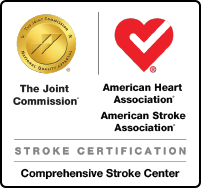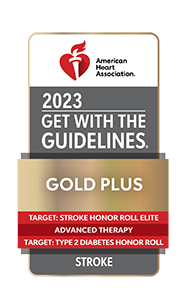Comprehensive Stroke Center Outcomes
The University of Maryland Medical Center Comprehensive Stroke Center provides various acute therapies for the complex stroke patient. The CSC treated 611 seriously ill stroke patients (411 patients with an ischemic stroke (non-bleeding stroke) and 200 with a hemorrhagic stroke (stroke caused by a ruptured blood vessel). Here you will find valuable information about stroke outcomes.
IV Alteplase Fiscal Year June 2021-July 2022
IV Alteplase is a clot busing medication provided to stroke patients. One of the complications for IV Alteplase is bleeding into the brain, often referred to as a hemorrhage. The hemorrhage rate after receiving IV Alteplase should be less than 6.4%. This rate is reported in the hallmark IV Alteplase to treat stroke trials. At UMMC the rate of hemorrhage after IV Alteplase administration was 1.9% (1/52 July 2021-June 2022).
*NINDS Study Group. Tissue Plasminogen Activator for Acute Ischemic Stroke. N Engl J Med; 19953333:1581-1588
Mechanical Thrombectomy Fiscal Year June 2021-July 2022
Sometimes a large clot in one of the blood vessels in the brain may cause a stroke. Sometimes a stroke patient may have a procedure called a mechanical thrombectomy to remove the clot. The procedure is performed by a specialty trained doctor called an Interventional Neuroradiologist. The procedure involves placing a thin catheter into the brain to remove the clot. Complications from this procedure may include having a new stroke, hemorrhage or damaging a blood vessel. At UMMC, 127 mechanical thrombectomy procedures were performed. Nationally, the complication rate is expected to be less than 7% (Defuse Trial, Albers et al.).* At UMMC the complication rate was zero.
A good outcome for stroke patients who have a mechanical thrombectomy procedure is a TICI grade of 2b or 3. The TICI stands for thrombolysis in cerebral infarction. The TICI grade is used to describe how well the blood flows in the treated blood vessel after having a mechanical thrombectomy procedure. At UMMC , 78% (101/127) of the TICI scores were 2b-3 compared to the national accepted rate of 76% reported in clinical trials.*
*G.W. Albers, M.P. Marks, S. Kemp, S. Christensen, J.P. Tsai, S. Ortega‑Gutierrez, for the DEFUSE 3 Investigators et al . Thrombectomy for Stroke at 6 to 16 Hours with Selection by Perfusion Imaging. NEJM January 24, 2018.
DOIL10.1056/NEJMoa1713973
Interventional Neuroradiology Diagnostic Procedures July 2021-July 2022
Interventional neuroradiologists perform various procedures to help diagnose patients with problems in the brain, for example aneurysms, tumors etc. Nationally the expected complication rates are expected to be less than 1%, complications may include a brain hemorrhage or a torn blood vessel. The UMMC CSC team of doctors performed 556 diagnostic procedures and no patient experienced a brain hemorrhage or torn blood vessel.
Carotid Artery Procedures January 2021-June 2022
At UMMC we have physician specialists called vascular surgeons who perform procedures for patients who have disease in the carotid arteries. One procedure performed involves placing a small tube, called a stent, in an artery to keep it open to allow blood flow to go through a narrowed blood vessel. Another procedure performed involves removing plague out of the carotid artery, this is called a carotid endarterectomy (CEA) procedure. Sometimes these procedures are performed when the patient is having symptoms and sometime performed as elective procedures.
Nationally, the complication rates at 30 days are expected to be <6% for patients who present with symptoms and have a procedure. Complications may include stroke or death. At UMMC, 56 patients had a stent or CEA procedure when they had symptoms. Follow up at 30 days revealed no patient had a stroke or died.
Nationally, the complication rates at 30 days are expected to be <3% for elective cases. Complications may include stroke or death. At UMMC, 58 patients had an elective stent or CEA procedure. Follow up at 30 days revealed no patient had a stroke or died.



